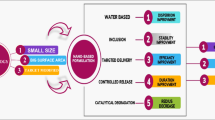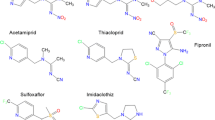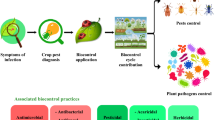Abstract
Drosophila suzukii (Matsumura) (Diptera: Drosophilidae) is an invasive species that causes serious damage to soft-skinned fruits. The use of plant-based biorational insecticides (plant extracts and essential oils) to control this pest has grown extensively. We conducted a systematic review and meta-analysis to examine the current status, trends, and perspectives of these studies, with a focus on the plant families and major compounds used as insecticides to control D. suzukii. The first article in this research field was published in 2015, and there has been exponential growth in subsequent years. Thirty-six botanical families were studied in these articles, with a prevalent interest in Myrtaceae and Lamiaceae plant species. The major constituents of these plant-based biorational molecules belong to monoterpenoids, followed by monoterpenes, benzene derivatives, and others. Geranial was the most frequent major constituent of these plant-based compounds. Our analysis revealed a few crucial consequences of the bias provided by the investigations using plant-based biorational insecticides for controlling D. suzukii. Firstly, there is a major focus on the pest species, with little or no attention paid to undesired effects on non-target beneficial organisms (e.g., pollinator bees, predators; parasitoids) and non-target pests. Secondly, the poor knowledge of how these plant-based biorational insecticides act on target and non-target organisms. Finally, there is a need to assess the efficacy of these substances under field conditions. Thus, attention is needed to address these gaps so that plant-based biorational insecticides can become a viable pest management tool for controlling D. suzukii.





Similar content being viewed by others
Data availability
The data that support the findings of this study are available from the first author upon reasonable request.
References
Abeijon LM, Kruger AP, Lutinski JA, Garcia FRM (2019) Can ants contribute to the conservative biological control of the South American fruit fly? Biosci J 35 (3): 941–948. https://doi.org/10.14393/BJ-v35n3a2019-41728
Ali S, Ullah M I, Sajjad A, Shakeel Q, & Hussain A (2021). Environmental and health effects of pesticide residues. Springer, London. In: Inamuddin, Ahamed MI & Lichtfouse E (eds) Sustainable Agriculture Reviews 48: Pesticide Occurrence, Analysis and Remediation Vol. 2 Analysis. Springer Cham, Switzerland, pp 311–336 https://doi.org/10.1007/978-3-030-54719-6_8
Amichot M, Joly P, Martin-Laurent F, Siaussat D, Lavoir AV (2018) Biocontrol, new questions for Ecotoxicology? Envirom Sci Pollut Res 25:33895–33900. https://doi.org/10.1007/s11356-018-3356-5
Andreazza F, Haddi K, Oliveira EE, Ferreira JAM (2016) Drosophila suzukii (Diptera: Drosophilidae) arrives at Minas Gerais state, a main strawberry production region in Brazil. Fla Entomol 99:796–798. https://doi.org/10.1653/024.099.0439
Andreazza F, Bernardi D, Santos RD, Garcia F, Oliveira EE, Botton M, Nava DE (2017) Drosophila Suzukii in Southern Neotropical Region: Status and future perspectives. Neotrop Entomol 46:591–605. https://doi.org/10.1007/s13744-017-0554-7
Asplen MK, Anfora G, Biondi A et al (2015) Invasion biology of spotted wing Drosophila (Drosophila suzukii): a global perspective and future priorities. J Pest Sci 88:469–494. https://doi.org/10.1007/s10340-015-0681-z
Bakkali F, Averbeck S, Averbeck D, Idaomar M (2008) Biological effects of essential oils–a review. Food Chem Toxicol 46:446–475. https://doi.org/10.1016/j.fct.2007.09.106
Bedini S, Bougherra HH, Flamini G et al (2016) Repellency of anethole-and estragole-type fennel essential oils against stored grain pests: the different twins. Bull Insectol 69:149–157
Bedini S, Cosci F, Tani C et al (2020) Essential oils as post-harvest crop protectants against the fruit fly Drosophila suzukii: Bioactivity and organoleptic profile. Insects 11(8):508. https://doi.org/10.3390/insects11080508
Boughdad A, Haddi K, El Bouazzati A et al (2021) First record of the invasive spotted wing Drosophila infesting berry crops in Africa. J Pest Sci 94:261–271. https://doi.org/10.1007/s10340-020-01280-0
Cini A, Ioriatti C, Anfora G (2012) A review of the invasion of Drosophila suzukii in Europe and a draft research agenda for integrated pest management. Bull Insectol 65:149–160
Collares LJ, Turchen LM, Guedes RNC (2023) Research trends, biases, and gaps in phytochemicals as insecticides: literature survey and meta-analysis. Plants 12(2):318. https://doi.org/10.3390/plants12020318
Dam D, Molitor D, Beyer M (2019) Natural compounds for controlling Drosophila suzukii. A Review Agron for Sustain Dev 39(6):53. https://doi.org/10.1007/s13593-019-0593-z
Deprá M, Poppe JL, Schmitz HJ et al (2014) The first records of the invasive pest Drosophila suzukii in the South American continent. J Pest Sci 87:379–383. https://doi.org/10.1007/s10340-014-0591-5
Enan E (2001) Insecticidal activity of essential oils: octopaminergic sites of action. Comp Biochem and Physiol Part c: Toxicol & Pharmacol 130(3):325–337. https://doi.org/10.1016/S1532-0456(01)00255-1
Europen Plant Protection Organization (EPPO) (2021) Global database. https://gd.eppo.int/taxon/DROSSU/distribution
Ferronato P, Woch AL, Soares PL, Bernardi D, Botton M, Andreazza F et al (2019) A Phylogeographic Approach to the Drosophila suzukii (Diptera: Drosophilidae) Invasion in Brazil. J Econ Entomol 112:425–433. https://doi.org/10.1093/jee/toy321
Funes CF, Garrido SA, Aquino DA, Escobar LI et al (2020) Nuevos registros de Pachycrepoideus vindemmiae (Hymenoptera: Pteromalidae) asociados con Drosophila suzukii (Diptera: Drosophilidae) en cultivos de cerezas y bayas de Argentina. Rev. Soc. Entomol. Arg. 79: 39–43. https://doi.org/10.25085/rsea.790406
Garcia FRM, Ovruski SM, Suárez L, Cancino J, Liburd OE (2020) Biological control of tephritid fruit flies in the Americas and Hawaii: A review of the use of parasitoids and predators. Insects 11(10):662. https://doi.org/10.3390/insects11100662
Garcia FRM, Lasa R, Funes CF, Buzzetti K (2022) Drosophila suzukii management in Latin America: current status and perspectives. J Econ Entomol 115(4):1008–1023. https://doi.org/10.1093/jee/toac052
Giunti G, Benelli G, Palmeri V, Laudani F, Ricupero M et al (2022) Non-target effects of essential oil-based biopesticides for crop protection: Impact on natural enemies, pollinators, and soil invertebrates. Biol Control 176:105071. https://doi.org/10.1016/j.biocontrol.2022.105071
Gutierrez AP, Ponti L, Dalton DT (2016) Analysis of the invasiveness of spotted wing Drosophila (Drosophila suzukii) in North America, Europe, and the Mediterranean Basin. Biol Invasions 18(12):3647–3663. https://doi.org/10.1007/s10530-016-1255-6
Haddi K, Turchen LM, Viteri Jumbo LO et al (2020) Rethinking biorational insecticides for pest management: Unintended effects and consequences. Pest Manag Sci 76(7):2286–2293. https://doi.org/10.1002/ps.5837
Hauser M (2011) A historic account of the invasion of Drosophila suzukii (Matsumura)(Diptera: Drosophilidae) in the continental United States, with remarks on their identification. Pest Manag Sci 67(11):1352–1357. https://doi.org/10.1002/ps.2265
Isman MB, Miresmailli S, Machial C (2011) Commercial opportunities for pesticides based on plant essential oils in agriculture, industry, and consumer products. Phytochem Rev 10:197–204. https://doi.org/10.1007/s11101-010-9170-4
Jang M, Kim J, Yoon KA et al (2017) Biological activity of Myrtaceae plant essential oils and their major components against Drosophila suzukii (Diptera: Drosophilidae). Pest Manag Sci 73(2):404–409. https://doi.org/10.1002/ps.4430
Lengai GM, Muthomi JW, Mbega ER (2020) Phytochemical activity and role of botanical pesticides in pest management for sustainable agricultural crop production. Sci Afr 7:e00239. https://doi.org/10.1016/j.sciaf.2019.e00239
Mendonça LP, Oliveira EE, Andreazza F et al (2019) Host Potential and Adaptive Responses of Drosophila suzukii (Diptera: Drosophilidae) to Barbados Cherries. J Econ Entomol 112:3002–3006. https://doi.org/10.1093/jee/toz195
Moher D, Liberati A, Tetzlaff J et al (2009) Preferred reporting items for systematic reviews and meta-analyses: the PRISMA statement. Annals of Intern Med 151(4):264–269. https://doi.org/10.7326/0003-4819-151-4-200908180-00135
Monteiro IN, Ferreira LOG, de Oliveira AKM (2021) Toxicity of the Lippia gracilis essential oil chemotype, pinene-cineole-limonene, on Spodoptera frugiperda (Lepidoptera: Noctuidae). Int J Trop Ins Sci 41:181–187. https://doi.org/10.1007/s42690-020-00191-y
Mossa ATH (2016) Green pesticides: Essential oils as biopesticides in insect-pest management. J Environ Sci Tech 9(5):354. https://doi.org/10.3923/jest.2016.354.378
Park CG, Jang M, Yoon KA, Kim J (2016) Insecticidal and acetylcholinesterase inhibitory activities of Lamiaceae plant essential oils and their major components against Drosophila suzukii (Diptera: Drosophilidae). Ind Crops Prod 89:507–513. https://doi.org/10.1016/j.indcrop.2016.06.008
Park CG, Jang M, Shin E, Kim J (2017) Myrtaceae plant essential oils and their β-triketone components as insecticides against Drosophila suzukii. Molecules 22:1050. https://doi.org/10.3390/molecules22071050
Pavela R, Benelli G (2016) Essential oils as ecofriendly biopesticides? Challenges and Constraints Trends Plant Sci 21(12):1000–1007. https://doi.org/10.1016/j.tplants.2016.10.005
Pineda M, Alves ELA, Antunes JÁ, Carvalho VC, Haddi K (2023) Low Concentrations of Eucalyptus Essential Oil Induce Age, Sex, and Mating Status-Dependent Stimulatory Responses in Drosophila suzukii. Agriculture 13(2):404. https://doi.org/10.3390/agriculture13020404
Priestley CM, Williamson EM, Wafford KA, Sattelle DB (2003) Thymol, a constituent of thyme essential oil, is a positive allosteric modulator of human GABAA receptors and a homo-oligomeric GABA receptor from Drosophila melanogaster. Braz J Pharmacol 140:1363–1372. https://doi.org/10.1038/sj.bjp.0705542
Regnault-Roger C, Vincent C, Arnason JT (2012) Essential oils in insect control: low-risk products in a high-stakes world. Ann Rev Entomol 57:405–424. https://doi.org/10.1146/annurev-ento-120710-100554
Renkema JM, Wright D, Buitenhuis R, Hallett RH (2016) Plant essential oils and potassium metabisulfite as repellents for Drosophila suzukii (Diptera: Drosophilidae). Sci Rep 6(1):21432. https://doi.org/10.1038/srep21432
Rota-Stabelli O, Ometto L, Tait G (2020) Distinct genotypes and phenotypes in European and American strains of Drosophila suzukii: implications for biology and management of an invasive organism. J Pest Sci 93:77–89. https://doi.org/10.1007/s10340-019-01172-y
Santos LA, Mendes MF, Krüger AP, Blauth ML et al (2017) Global potential distribution of Drosophila suzukii (Diptera, Drosophilidae). PLoS ONE 12(3):e0174318. https://doi.org/10.1371/journal.pone.0174318
Schetelig MF, Lee KZ, Otto S et al (2017) Environmentally sustainable pest control options for Drosophila suzukii. J Applied Entomol 142(1–2):3–17. https://doi.org/10.1111/jen.12469
Schwarzer G, Carpenter JR, Rücker G (2015) Meta-analysis with R. Springer, London
Shawer R (2020) Chemical control of Drosophila suzukii. In: Garcia FRM (ed) Drosophila suzukii management, pp 133-142. Springer Cham, Switzerland
Tait G, Mermer S, Stockton D et al (2021) Drosophila suzukii (Diptera: Drosophilidae): a decade of research towards a sustainable integrated pest management program. J Econ Entomol 114(5):1950–1974. https://doi.org/10.1093/jee/toab158
Tong F, Gross AD, Dolan MC, Coats JR (2013) The phenolic monoterpenoid carvacrol inhibits the binding of nicotine to the housefly nicotinic acetylcholine receptor. Pest Manag Sci 69(7):775–780. https://doi.org/10.1002/ps.3443
Turchen LM, Cosme-Júnior L, Guedes RNC (2020) Plant-derived insecticides under meta-analyses: status, biases, and knowledge gaps. Insects 11(8):532. https://doi.org/10.3390/insects11080532
Viana JPC, Lopes-da-Silva M, Viana MC, Tidon R (2023) Establishment and Expansion Scenario of Drosophila suzukii (Diptera: Drosophilidae) in Central Brazil. Neotrop Entomol 1–11. https://doi.org/10.1007/s13744-023-01042-4
Walton VM, Burrack HJ, Dalton DT, Isaacs R et al (2016) Past, present and future of Drosophila suzukii: distribution, impact and management in United States berry fruits. Acta Hort 1117: 87–94. https://doi.org/10.17660/ActaHortic.2016.1117.16
Wang X, Daane KM, Hoelmer KA, Lee JC (2020) Biological control of spotted-wing Drosophila: an update on promising agents. In: Garcia FRM (ed) Drosophila suzukii management, pp 143-167. Springer Cham, Switzerland
Wang Q, Xu P, Andreazza F, Liu Y et al (2021) Identification of multiple odorant receptors essential for pyrethrum repellency in Drosophila melanogaster. PLoS Genet 17:e1009677. https://doi.org/10.1371/journal.pgen.1009677
Zanuncio-Junior JS, Fornazier MJ, Andreazza F et al (2017) Spread of two invasive flies (Diptera: Drosophilidae) infesting commercial fruits in Southeastern Brazil. Fla Entomol 101:522–525. https://doi.org/10.1653/024.101.0328
Acknowledgements
This research was funded by the National Council of Scientific and Technological Development (CNPq—process numbers: 309890/2022-5, 152366/2022-9), CAPES foundation (Finance Code 001); the Minas Gerais State Foundation for Research Aid (APQ 03771-18); We also thank Dr. Leonardo Morais Turchen (UFV) for special help in meta-analysis; Júlia Martins Gonçalves (UFV) who helped in illustrations with valuable advice.
Author information
Authors and Affiliations
Contributions
General overview and proposal: EEO and FRMG; Conceptualization: VFS, LMA, SHCA, FRMG, EEO; Writing – original draft preparation: VFS, LMA; Analysis on bibliometric production: VFS, LMS, SHCA; Writing – review and editing: VFS, LMA, SHCA, FRMG, EEO.
Corresponding author
Ethics declarations
Conflict of interest
The authors declare no competing interests.
Additional information
Edited by Geraldo A Carvalho
Publisher's Note
Springer Nature remains neutral with regard to jurisdictional claims in published maps and institutional affiliations.
Supplementary Information
Below is the link to the electronic supplementary material.
Rights and permissions
Springer Nature or its licensor (e.g. a society or other partner) holds exclusive rights to this article under a publishing agreement with the author(s) or other rightsholder(s); author self-archiving of the accepted manuscript version of this article is solely governed by the terms of such publishing agreement and applicable law.
About this article
Cite this article
dos Santos, V.F., Abeijon, L.M., da Cruz Araújo, S.H. et al. The Potential of Plant-Based Biorational Products for the Drosophila suzukii Control: Current Status, Opportunities, and Limitations. Neotrop Entomol 53, 236–243 (2024). https://doi.org/10.1007/s13744-023-01119-0
Received:
Accepted:
Published:
Issue Date:
DOI: https://doi.org/10.1007/s13744-023-01119-0




